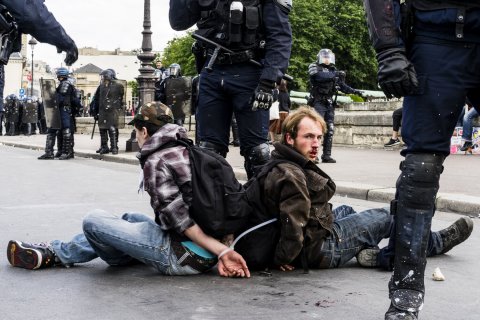Contesting Governance: new interdisciplinary research platform on contestation of power

While still struggling with the impact of the Covid-19 pandemic, American cities are now the epicenter of daily unrest and civil protest. The death of George Floyd has triggered mass demonstrations against racism and police violence. Not only in the U.S. but all over the world, people are gathering to stand up for social justice and equality. By contesting state, police or other governmental institutions, they are questioning existing power structures. This contestation of governance is the central focus of a new research platform at Utrecht University. By bringing researchers from various disciplines together, the Contesting Governance platform tries to unravel how power is constituted and how contestation of governance relates to open societies - a topic which is currently all the more relevant.
The newly established research platform applies critical perspectives to understand constitution of power and how power operates across particular institutional and societal fields. Researchers connected to the platform seek to unpack the dimensions of power and relationships that facilitate or block change. By focusing on societies facing political instability and conflict across the globe, they investigate and evaluate governance structures and institutions that contest and confront the state - as well as those that compete, collaborate or extend it.

Understanding the conditions for an open society
Studying contestation of governance, in all its shapes and sizes, is crucial to get a better understanding of the conditions for creating, safeguarding or endangering open societies. Because in some cases contesting governance can lead to more open societies and stronger institutions, while in other instances it may endanger them. With this critical exploration of themes related to institutions, open societies, security and human rights, the Contested Governance platform connects two important research networks at Utrecht University: the strategic theme Institutions for Open Societies and the Centre for Global Challenges.
Building bridges in research and education
Within their interdisciplinary research projects, the Contesting Governance scholars address pertinent questions such as: How is state violence contested by civil society? How do citizens respond when they feel unprotected, abandoned or attacked by the state? How do people voice concerns and make claims in the streets, or in court? How do people negotiate their everyday needs and livelihoods when (private) armed actors control their material and social spaces? What kinds of rules and authority emerge in places where state governance is weak or has ceased to exist?
Going beyond normative framings that picture what the rules should be and how they should be exercised, our group has the combined expertise to understand how 'de facto' governance and 'de jure' governance intersect, and how they strengthen and/or contest each other
To address these governance issues, the researchers combine the normative framework of law with the complexity that emerges from grounded empirical research and explores the tensions between them. Aiming to build bridges between international law, anthropology and conflict studies, the platform finds newness and inspiration in interdisciplinary dialogue, collaboration and teaching around concepts such as sovereignty, security, governance, violence, human rights, and legitimacy.
Pushing the boundaries of contemporary research on governance, institutions, rights and security.
Contesting Governance first came together as a research group, connected to the Utrecht Centre for Global Challenges, and has now expanded to a multidisciplinary platform with researchers from across Utrecht University. The core team is made up of researchers from the faculties Law, Economics and Governance, Humanities, and Social and Behavioural Sciences. The new platform is currently led by Dr. Brianne McGonigle Leyh , Dr. Martijn Oosterbaan, and Dr. Chris van der Borgh.

